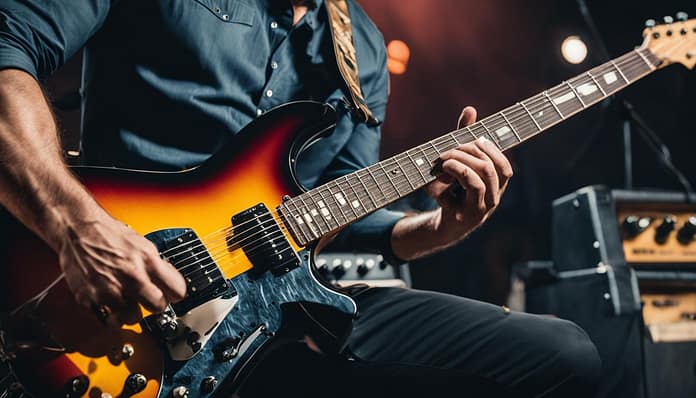This post may contain affiliate links. As an Amazon associate, Google associate as well as associate for other programs, Guitar & Music Institute may earn commissions from qualifying purchases.

Improving your guitar skills takes time, dedication, and the right approach. Whether you’re just starting out or you’re a seasoned player looking to take your skills to the next level, there are a few key strategies that can help you reach your goals faster.
Set specific goals: Establishing clear and measurable objectives will provide focus and direction to your practice sessions.
Practice regularly: Consistency is key when it comes to improving your guitar skills quickly. Set aside dedicated time each day to practice and make it a priority.
Use a metronome: A metronome is a valuable tool for developing your sense of timing and rhythm. It can help you play at a faster pace and improve your overall accuracy.
Get quality instruction: Investing in quality guitar instruction, whether through private lessons or online courses, can provide valuable guidance and feedback to help you progress more efficiently.
Break things down and practice slowly: When learning complex techniques or songs, break them down into smaller parts and practice each section slowly. This will help you build muscle memory and ensure accuracy before increasing the tempo.
Experiment with different practice techniques: Don’t be afraid to try different practice methods to find what works best for you. This could include playing along to backing tracks, jamming with other musicians, or using apps and software to enhance your practice sessions.
Get feedback from others (and yourself): Seek feedback from experienced guitarists or instructors to identify areas for improvement. Additionally, record your practice sessions and listen back to objectively assess your playing.
Visualize your playing: Mental practice can be a powerful tool for improving your guitar skills. Take time to visualize yourself playing difficult passages or executing challenging techniques successfully.
By incorporating these techniques into your practice routine, you can accelerate your progress and improve your guitar skills in a short amount of time.
Key Takeaways:
- Set specific goals to provide focus and direction to your practice sessions.
- Practice regularly to build consistency and make progress.
- Utilize a metronome to develop timing and rhythm skills.
- Invest in quality instruction for guidance and feedback.
- Break things down and practice slowly to build muscle memory and accuracy.
Check out our latest free and paid guitar books and downloads at https://gmiguitarshop.com/.
The Importance of Patience and Focus
When it comes to improving your guitar skills rapidly and efficiently, one of the most crucial factors to consider is patience and focus. It’s important to embrace the journey and understand that progress takes time. Many guitarists make the mistake of trying to rush their development, leading to frustration and hindering their improvement.
By prioritizing the fundamentals and building a strong foundation, you can lay the groundwork for accelerated skill development. Consistent practice is key – make it a habit to dedicate regular time to honing your craft. Celebrate each milestone along the way to keep your motivation high and maintain your momentum.
Just like a tree needs time to grow strong roots before it can reach for the sky, your guitar skills require a solid foundation before you can tackle advanced techniques effectively. Take the time to master the essentials, such as proper hand positioning, posture, and basic chord progressions.
Once you have a strong foundation, gradually introduce more complex techniques and challenge yourself with new skills. Remember, Rome wasn’t built in a day, and your guitar playing won’t reach its peak overnight.
Focus on consistency, not speed. Instead of aiming for rapid progress in guitar techniques, concentrate on consistent quality practice. It’s better to practice for shorter durations every day rather than cramming in lengthy sessions sporadically. This approach ensures that you retain the information you learn and build muscle memory more effectively.
Utilize effective methods for efficient guitar improvement. Experiment with various practice techniques to find what works best for you. This might include utilizing a metronome to develop rhythm and timing or incorporating ear training exercises to enhance your improvisation skills. There are numerous resources available that offer guidance on efficient guitar techniques and accelerated skill development.
By cultivating patience, maintaining focus, and implementing effective methods for fast guitar improvement, you can elevate your skills and progress more rapidly than you ever thought possible. Stick to the path, and soon you’ll be amazed at how far you’ve come.
The Power of Consistency
To reinforce the importance of patience and focus in your guitar journey, let’s take a closer look at the power of consistency. Consistent practice helps you develop muscle memory, allowing you to play without conscious effort. It builds confidence, enhances your repertoire, and fosters a deeper connection with your instrument.
Consider creating a practice routine that targets specific areas of improvement while allowing room for exploration and creativity. Set achievable goals and track your progress along the way. Remember, it’s about the journey and the steady, consistent growth rather than the destination alone.
Patience and focus are not only valuable assets in your guitar playing but also in other areas of your life. Cultivating these qualities will not only help you become a better musician but also a more disciplined, resilient individual. Embrace the process, trust in your abilities, and enjoy the transformation that takes place as you strive for excellence.
Essential Exercises for Speed Development
To improve your guitar skills quickly, it’s crucial to incorporate specific exercises into your practice routine. These exercises are designed to enhance your speed, coordination, and technical abilities. By regularly practicing these exercises, you can effectively develop your skills and make quick progress in your guitar techniques.
1. Relaxation and Breathing Techniques
Start by focusing on relaxation and breathing exercises to loosen your muscles and reduce tension. Deep breathing and mindful relaxation techniques can help you maintain a calm and focused state while playing.
2. Stretching Exercises
Prioritize stretching exercises for your fingers, wrists, and arms to improve flexibility and prevent injuries. Simple stretches such as finger rolls, wrist rotations, and arm extensions can greatly benefit your playing.
3. Incremental Practice with a Metronome
Practice with a metronome to develop a solid sense of timing and rhythm. Start with a slower tempo and gradually increase the speed as you become comfortable. This incremental approach allows you to build muscle memory and increase your speed gradually.
4. Legato Playing
Utilize legato playing techniques, such as hammer-ons and pull-offs, to increase speed and fluidity. Legato techniques can help you play faster and more efficiently by using your fretting hand to produce additional notes.
5. Economize Your Picking Technique
Focus on economizing your picking technique to minimize unnecessary movements. Efficient picking with both alternate picking and sweep picking techniques can help you increase speed while conserving energy.
6. Pressing the Strings Only as Hard as Necessary
Avoid excessive finger pressure when pressing the strings down. Press the strings only as hard as necessary to produce a clean sound. This technique reduces tension in your fingers and improves overall playing efficiency.
7. Practicing Finger Twisters
Include finger twisters in your practice routine to improve dexterity and finger independence. These exercises involve intricate patterns and sequences that challenge your fingers’ coordination and strength.
8. Adjusting the Action on Your Guitar
Consider adjusting the action on your guitar to optimize playability. Lower action can make it easier to play complex techniques and improve your overall speed and accuracy.
9. Experimenting with Different Pick Angles
Experiment with different pick angles and positions to find what works best for you. Changing the angle of your pick can affect the attack, tone, and accuracy of your playing, allowing you to explore new possibilities.
By incorporating these essential exercises into your practice routine, you’ll develop the necessary skills for rapid growth in guitar playing abilities. Remember to practice consistently and stay focused on your goals. Check out our latest free and paid guitar books and downloads at https://gmiguitarshop.com/ to further enhance your guitar skills.

| Exercise | Description |
|---|---|
| Relaxation and Breathing Techniques | Focusing on relaxation and breathing exercises to reduce tension and stay calm while playing. |
| Stretching Exercises | Performing stretches to improve finger, wrist, and arm flexibility for better mobility and injury prevention. |
| Incremental Practice with a Metronome | Practicing with a metronome to enhance timing and rhythm by gradually increasing speed. |
| Legato Playing | Utilizing hammer-ons and pull-offs to play faster and more smoothly by minimizing picking motions. |
| Economize Your Picking Technique | Optimizing your picking technique to minimize unnecessary movements and conserve energy. |
| Pressing the Strings Only as Hard as Necessary | Reducing finger pressure to improve overall playing efficiency and reduce tension. |
| Practicing Finger Twisters | Working on complex finger patterns to enhance finger independence and dexterity. |
| Adjusting the Action on Your Guitar | Optimizing the playability of your instrument by adjusting the action for better speed and accuracy. |
| Experimenting with Different Pick Angles | Trying out various pick angles and positions to discover the most comfortable and effective playing style. |
Setting Goals and Consistent Practice
Improving your guitar skills quickly requires a combination of setting specific goals and maintaining consistent practice. When it comes to goal-setting, it’s essential to be specific and realistic. Define what you want to achieve with your guitar playing, whether it’s learning a particular song, improving your fingerpicking technique, or developing your strumming skills. Having clear and achievable goals will provide you with motivation and direction.
Consistency in practice is also key to rapid improvement in guitar playing. It’s important to establish a regular practice routine and stick to it. Try incorporating short practice sessions into your daily schedule, focusing on the areas you want to improve. Whether it’s allocating 20 minutes every morning or practicing for an hour in the evening, consistency will help you progress quickly.
Remember that improvement takes time and dedication. It’s not about how much time you spend practicing but rather the quality and focus you put into each practice session. Strive for efficient practice techniques, such as breaking down complex skills into smaller, manageable parts and gradually increasing the tempo. Consistency coupled with mindful practice will ensure steady progress and quick improvement in your guitar techniques.
Benefits of Goal-Setting and Consistent Practice
- Direction and Motivation: Setting goals provides a sense of purpose and direction to your guitar playing journey. It gives you something to aim for and fuels your motivation.
- Structured Learning: Clear goals help you structure your practice sessions and focus on specific areas of improvement, ensuring efficient progress.
- Measurable Progress: By setting benchmarks and tracking your progress, you can celebrate milestones along the way and stay motivated.
- Time Management: Consistent practice allows you to manage your time effectively and make the most out of each session.
- Confidence Boost: As you consistently work towards your goals, you’ll gain confidence in your abilities, spurring further improvement.
By setting goals and committing to consistent practice, you can maximize your guitar learning potential and see rapid progress in your playing. It’s time to take the necessary steps towards achieving your musical aspirations. Stay focused, be patient, and enjoy the journey.
Conclusion
Improving your guitar skills quickly requires dedication, patience, and focused practice. By setting specific goals, using efficient practice techniques, and incorporating targeted exercises into your routine, you can experience rapid growth in your guitar playing abilities. It’s important to stay consistent, be patient with yourself, and celebrate your achievements along the way.
With the right mindset and approach, you can unlock your potential and take your guitar skills to the next level in no time. Remember that progress takes time, but by practicing regularly and using advanced guitar techniques for rapid improvement, you can see significant results.
At GMIGuitarShop.com, we offer a wide range of free and paid guitar books and downloads that can help you in your journey towards fast improvement. Visit our website today to explore our collection and take your guitar playing to new heights.
FAQ
How can I improve my guitar skills quickly?
To improve your guitar skills quickly, it’s important to set specific goals, practice regularly, use a metronome, get quality instruction, break things down and practice slowly, experiment with different practice techniques, get feedback from others (and yourself), and visualize your playing.
What is the importance of patience and focus in improving guitar skills?
Patience and focus are crucial in improving guitar skills. Rushing progress can lead to frustration and hinder improvement. It’s important to embrace the process, focus on fundamentals, develop a solid foundation, and practice consistently.
What are some essential exercises for speed development on the guitar?
Essential exercises for speed development include relaxation and breathing techniques, stretching exercises, incremental practice with a metronome, using legato playing to increase speed, economizing your picking technique, pressing the strings only as hard as necessary, practicing finger twisters to improve dexterity, adjusting the action on your guitar, and experimenting with different pick angles.
How can setting goals and consistent practice help improve guitar skills quickly?
Setting specific goals and maintaining consistent practice are key factors in improving guitar skills quickly. Specific goals provide motivation and direction, while consistent practice allows for regular progress. Incorporating regular short practice sessions into your daily routine and focusing on areas you want to improve can accelerate your improvement and see quick progress in your guitar techniques.
How can I take my guitar skills to the next level in a short amount of time?
Improving guitar skills quickly requires dedication, patience, and focused practice. By setting specific goals, using efficient practice techniques, and incorporating targeted exercises into your routine, you can accelerate your progress and see rapid improvement in your guitar playing. Stay consistent, be patient with yourself, and celebrate achievements along the way.
Source Links
- https://www.fretjam.com/play-guitar-fast.html
- https://happybluesman.com/7-guitar-exercises-play-faster/
- https://www.pickupmusic.com/blog/8-ways-to-improve-your-guitar-skills
This post may contain affiliate links. As an Amazon associate, Google associate as well as associate for other programs, Guitar & Music Institute may earn commissions from qualifying purchases.



















